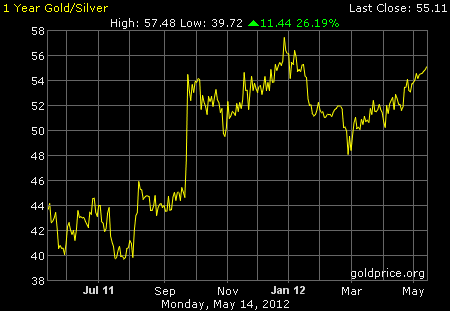-
In February this year, ZeroHedge reported that the Dutch Central Bank obtained a court order forcing a pension fund (SPVG) to sell the bulk of its gold assets.
The Reason? That gold is a commodity (not money), and that SPVG holding more than 13% of its assets in gold was not in the interest of the pension fund participants. Ridiculous as it sounds, the Dutch Central Bank has a say in how pension funds manage their gold investments.
Perhaps the most stunning example of what may be in store for asset managers and pension funds (and possibly retail holders) who dare to challenge central bank monetary authority comes from the Netherlands, where we have just witnessed the 21st century equivalent of Executive Order 6102. The story in a nutshell (and as translated loosely from the primary source presented below): the glassworkers pension fund (SPVG) was ordered by De Nederlandsche Bank (DNB, or the equivalent of the Dutch central bank), that it has to sell the bulk of its gold assets.
After the SPVG refused to comply with the order, the DNB went to court and the decision has come out, siding with the central bank, ordering the SPVG to sell the required gold within two months. The pension fund, which invests for 1142 employees, in late 2009 had gold bars worth 34.6 million euros, or about 1400 kilograms. The total fund assets amounted to 288 million euros at that time. The DNB argued gold is a commodity and holding 13 percent was overweight in comparison to the 2.7% average that pension funds are invested in commodities.
DNB has found that such a large proportion of gold is inconsistent with the interests of the participants. SPVG sees gold as a medium of exchange, such as euros, but DNB believes that the price of gold fluctuates too much for it to be classified as an investment.
Translation of the translation: the central bank has now directly ordered a fund how to allocate its gold assets, because it explicitly disagreed with the fund’s statement that gold is money, claiming instead that it is nothing but a very volatile commodity. Very soon no pension funds in the Netherlands will be allowed to hold any amount of gold more than the merely nominal. This latest gold confiscation equivalent event is most certainly coming to a banana republic near you.
-
Today, GoldMoney announced that it has been forced to close all Dutch accounts for “offering investment objects in the Netherlands without a licence”. Looks like the Dutch authorities are going all out to make it difficult for ordinary folks to use gold as a store of value. I’m curious why there has been no similar notices from BullionVault. Why should one be affected while the other is not? What did they do differently?
Dear Valued Customer,
It is with tremendous regret that I am writing to inform you of our recent decision to discontinue offering our services to all customers resident in the Netherlands. Please note, we at GoldMoney have explored all possible options to prevent this outcome, and this is not a decision we have taken lightly. This position is unique to the Netherlands, and unfortunately because you are resident in the Netherlands, you are one of those affected, which we very much regret. Kindly allow me to explain our position:
On 27 January 2011, we were contacted by the Autoriteit Financiële Markten (AFM), the Netherlands financial regulator, which indicated that, in its view, GoldMoney was “offering investment objects in the Netherlands without a licence” in breach of Section 2:55 of the Netherlands Financial Supervision Act (Wet op het financieel toezicht, Wft). At the end of 2010, the AFM first announced publicly its policy viewpoint that investments in precious metals could – under certain circumstances – be characterised as offering of investment objects. The AFM demanded that we cease to do so until we agreed to subject our business to their regulation by applying for a licence as an offeror of investment objects within the meaning of Section 2:55 Wft. Although we disagreed with the AFM’s assessment, we voluntarily offered to stop accepting new Netherlands-resident customers as of 1 February 2011 until we could resolve this matter with the AFM.
We have dedicated the last few months to working with our Netherlands lawyers to present our case to the AFM, namely that precious metals are not included within the concept of “investment objects” regulated by the AFM, and that, in any case, Netherlands regulation is not applicable to GoldMoney because we do business in Jersey, rather than within the Netherlands. Unfortunately, we have been unsuccessful in changing the AFM’s view on this matter. As we do not want to subject ourselves, and by extension our customers, to unnecessary and unpredictable regulatory requirements, we have reached the difficult conclusion that the only way to resolve this situation is to cease all business with Netherlands-resident customers.
We intend to resolve this issue and return to doing business with residents in the Netherlands in the future. Should this be the case we will make an announcement. But in the meantime, unfortunately, I am very sorry to inform you that we are unable to offer you our services any longer. Subject to article 10-A of our Customer Agreement, we will require you to close your GoldMoney Holding. This is to occur no later than the close of business on Monday 31 October 2011.
We have outlined below a number of possible options for how you may liquidate your current position, including the physical delivery of small gold bars to your home address or a sale to cash with a free transfer of the proceeds to your bank account.
By offering you the option to take physical delivery of your gold, we hope to fulfil your expectations with regards to the physical ownership of your metals. We thank you for your business and the trust you have placed in us.
Sincerely,
Geoff Turk
CEO – GoldMoney
-
While Dutch customers may conveniently take possession of their physical gold instead of liquidating them in light of the recent sharp fall in price, no mention was made regarding silver. Going by their terms of service, “You can also take delivery of silver bars, provided you have at least 30,000 ounces of silver, which is roughly one pallet of thirty 1,000 ounce bars“, Dutch customers holding less than about US$1M worth of silver at today’s prices would be forced to liquidate at the worst possible time ever.
-
News Update:
-
 NETHERLANDS – A Rotterdam court has overturned the Dutch pensions regulator’s recent demand that SPVG – the pension fund for glass manufacturers – divest more than three-quarters of its 13% gold allocation.
NETHERLANDS – A Rotterdam court has overturned the Dutch pensions regulator’s recent demand that SPVG – the pension fund for glass manufacturers – divest more than three-quarters of its 13% gold allocation.
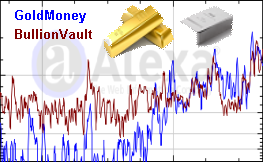
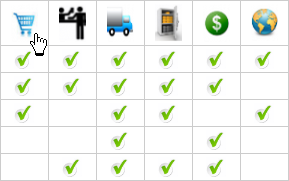
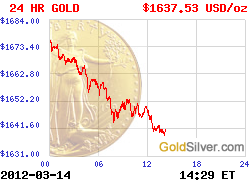
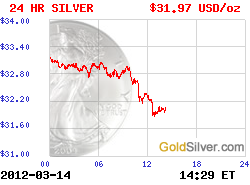
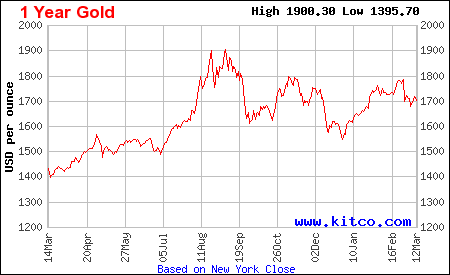 More Charts: 1-Month, 1-Year, 5-Year, 10-Year
More Charts: 1-Month, 1-Year, 5-Year, 10-Year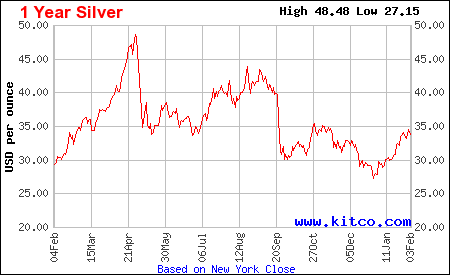 More Charts: 1-Month, 1-Year, 5-Year, 10-Year
More Charts: 1-Month, 1-Year, 5-Year, 10-Year